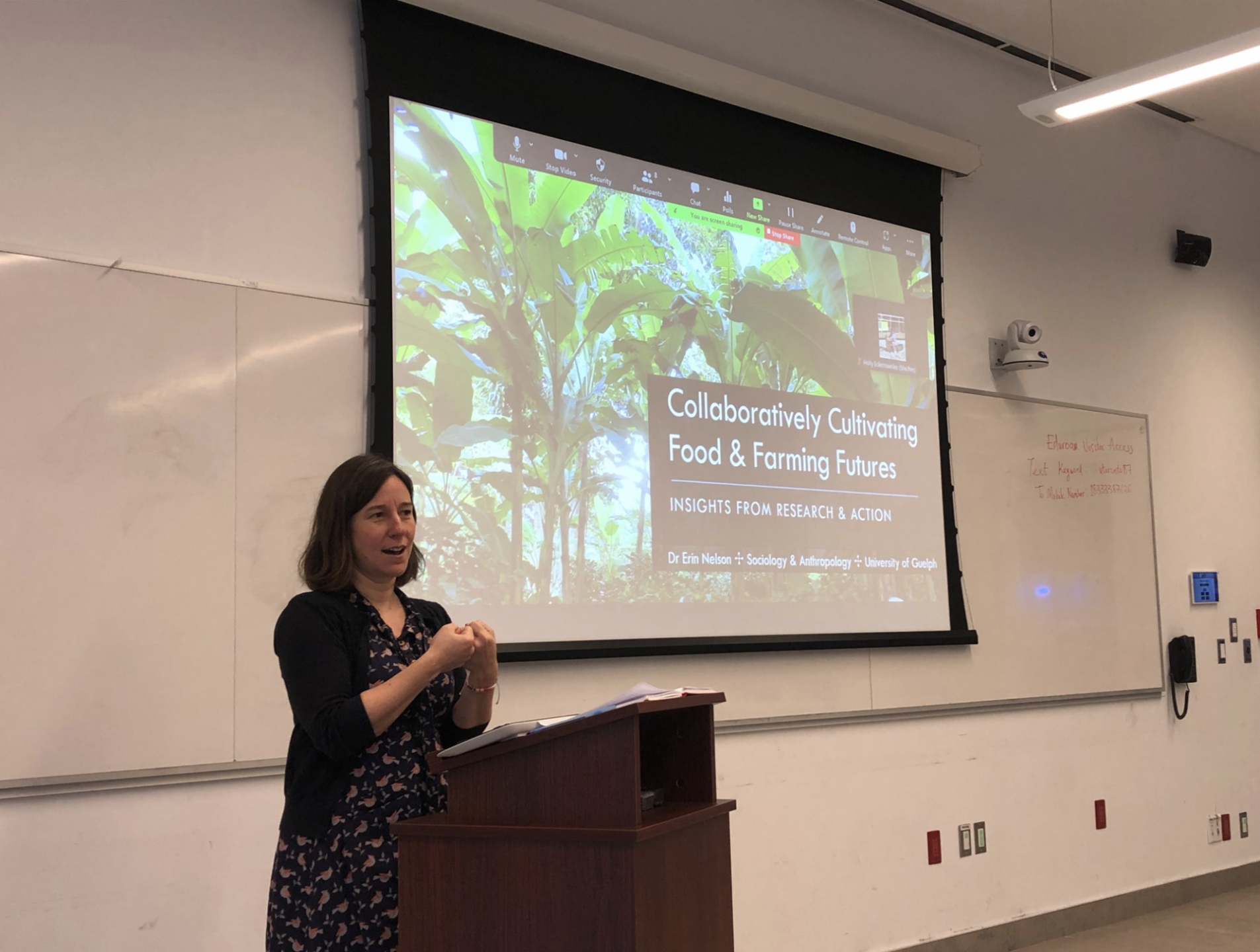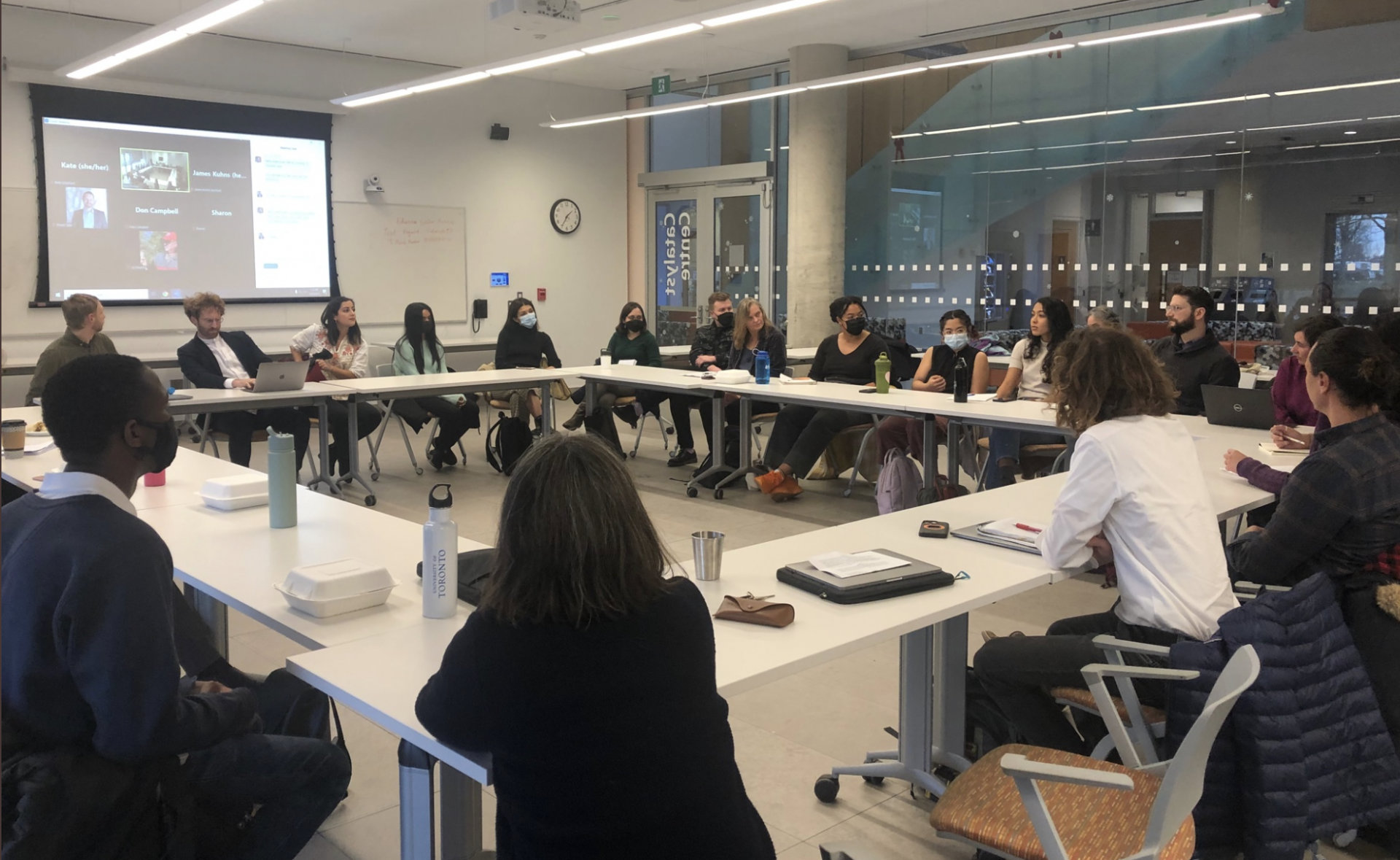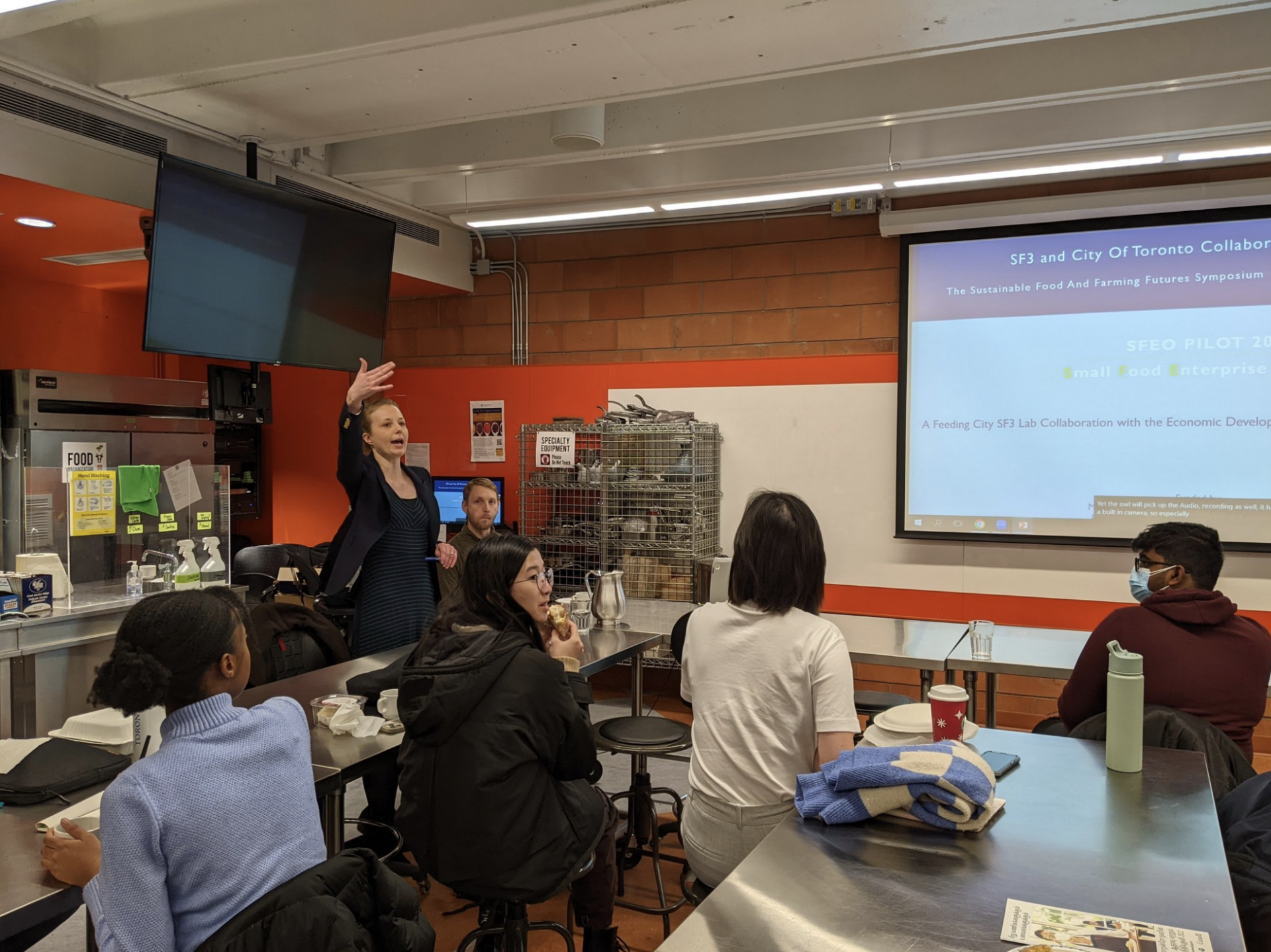The Sustainable Food and Farming Futures Cluster (SF3) hosted its first annual symposium on Friday December 9th at the University of Toronto Scarborough. The symposium brought together academic researchers, community organizations, food activists, and institutional partners to engage in productive dialogue about alternative food system resilience from the GTA to the Globe. It opened with two plenary speakers, Erin Nelson and Marina Queirolo, followed by a delicious lunch catered by Bao Mama at the Culinary Research Center. The afternoon hosted two roundtable workshops: one on research partnerships with organizations working in urban and peri-urban agriculture and one presenting findings from the Restaurant Resiliency Feeding City Lab project.
First Plenary (9:30-10:30)
Dr. Erin Nelson
Collaboratively Cultivating Better Food and Farming Futures: Insights from Research and Action
Erin Nelson is Assistant Professor in the University of Guelph's Department of Sociology and Anthropology, and affiliate Faculty with the Guelph Institute of Development Studies. Dr. Nelson's research explores the development of more sustainable food systems with an emphasis on agroecology initiatives in Canada and Latin America. In particular, her work examines how farmer-led knowledge-generation and exchange can build capacity for agroecological production, and how agroecology can contribute to ecological resilience and community wellbeing.
In her presentation, Dr. Nelson shared insights from two decades of work to support more sustainable food systems on farms, with NGOs, and as a community-engaged scholar. Drawing on experience in Ontario, Cuba, and Mexico, she emphasized the importance of local-global connections, multilingual research, and the importance of knowledge exchange within sustainable and just food systems.

Second Plenary (11:00-12:00)
Marina Queirolo
Market Cities: Building the “Missing Middle” in Sustainable Food Systems
Marina Queirolo is a community builder and entrepreneur active in Toronto’s alternative food network. She has worked as a chef in Buenos Aires, spearheaded Evergreen’s market initiatives, and served on the Toronto Food Policy Council. She currently leads Market City TO, which highlights Toronto's public food infrastructure.
Drawing on her “Market Cities” framework, Marina’s plenary discussed the vital role that community focused infrastructure has in building equitable alternatives to the dominant agribusiness model. In conjunction with efforts to develop sustainable agriculture in Ontario, market cities provide the links between food production, processing, distribution, consumption, and waste management at a scale where small and medium businesses and community initiatives can benefit both the residents and the sector. Ultimately, Marina asked whether Toronto can become a fully realized Market City, and offers real world examples of how it is already becoming one.
{"preview_thumbnail":"/foodandfarm/sites/utsc.utoronto.ca.foodandfarm/files/styles/video_embed_wysiwyg_preview/public/video_thumbnails/vK5rsI7XATc.jpg?itok=Py9HtDvX","video_url":"https://www.youtube.com/watch?v=vK5rsI7XATc","settings":{"responsive":1,"width":"854","height":"480","autoplay":0},"settings_summary":["Embedded Video (Responsive)."]}
Here is a link to Marina Queirolo's Presentation.
First Workshop (1:00-3:30)
SF3 and Research Partner Workshop
The afternoon at the Sustainable Food and Farming Futures cluster launched with a workshop including six organizations aligned with urban and peri urban agriculture in the Toronto region. The structure of the workshop was to merge researchers and leaders in the urban agriculture space to discuss experiences and constraints with agriculture in the Toronto region. We spoke for 1.5 hours on three key aspects of urban and peri-urban agriculture: space, seeds and soil. The intention of the workshop was to create a space for dialogue and experience sharing and did not centre any specific goals. However, through conversation, focal outcomes were noted. These are listed here as a base for emerging community research relationships.
Urban and peri-urban agriculture spaces:
- Competing interests to achieve urban agriculture within constrained space
- Protection of biodiversity
- Zoning issues within cities, ie there is no agricultural zoning in the City of Toronto
- An interest in a distributed urban agriculture approach
Urban and peri-urban agriculture seeds:
- Coordination needed for seed saving and varietal testing
- Chemicals on seeds are an environmental cost
- Mismatch between pollinators and new crops in urban environments
Urban and peri-urban soils:
- Compost as key to bring life to urban soils
- Community compost and food waste in a circular system
- Constraints on compost production in cities
- Preserving soil biodiversity through cultural and state conservation practices
List of participants:
- Toronto Urban Growers
- Rouge National Urban Park
- Malvern Family Resource Centre
- Toronto Metropolitan University Urban Farm
- Centre for Immigrant and Community Services
- Tamales y Bicycletas

Second Workshop (3:30-5:00)
Feeding City-SF3 Collaboration Workshop with City of Toronto
Toronto’s small-scale food providers faced unprecedented challenges throughout the pandemic. In this open and collaborative workshop, Feeding City's research team in partnership with the City of Toronto’s Economic Development and Culture Division discussed recent research conducted with Scarborough restaurateurs and its implications for future urban food policy. A few highlights from the workshop are listed here.
Community engaged research insights
- It is important respect restaurant owners by valuing their time and supporting their businesses
- Better results were achieved when the research was conducted in-person, opposed to over the phone or by email
- It is important to visit restaurants at off-peak hours when the business owners had more time to speak
Barriers that restaurants face while trying to access government support
- Not knowing that these supports exist
- Language barriers
- Lack the time and capacity to fill out the paperwork
- Lack of trust that these funds and supports will help their businesses

